Unit 2 I`ll help to clean up the city parks Section A 习题(含解析)人教版英语八年级下册
文档属性
| 名称 | Unit 2 I`ll help to clean up the city parks Section A 习题(含解析)人教版英语八年级下册 |
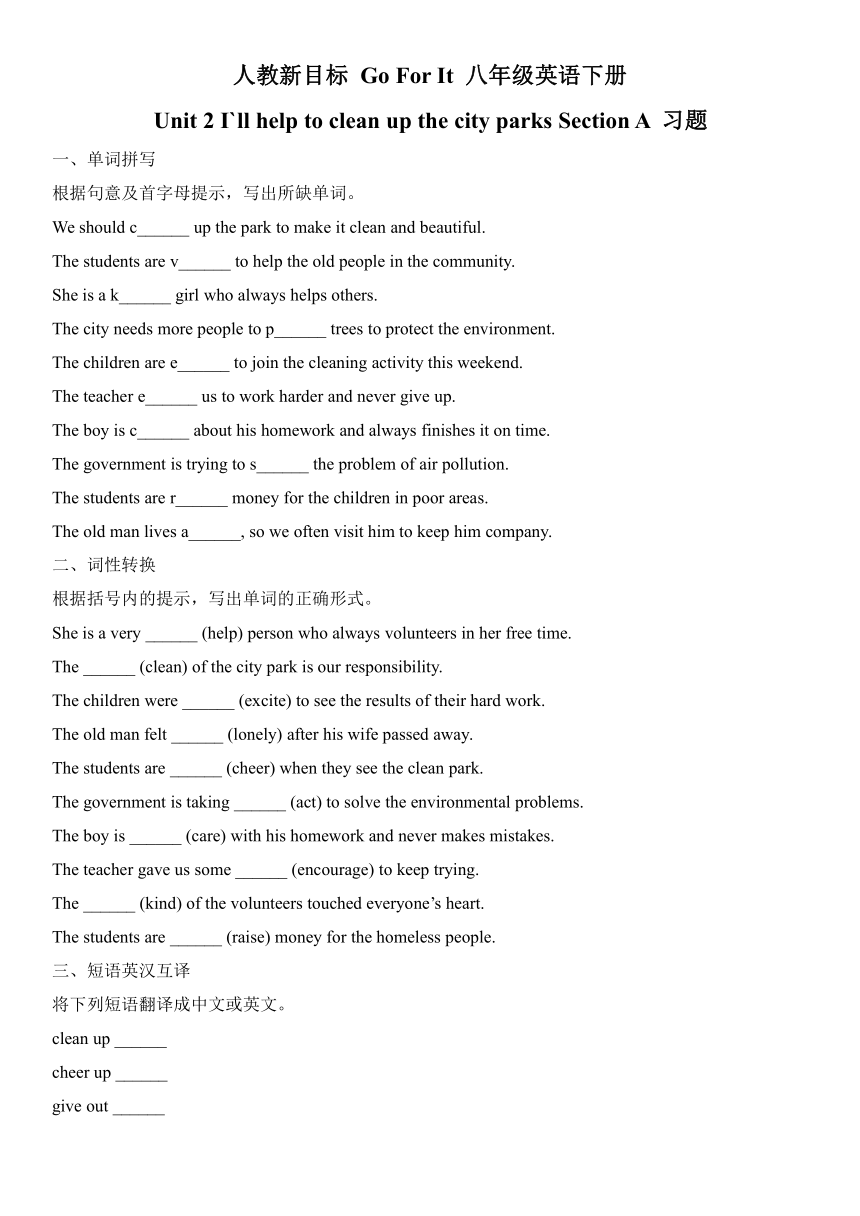
|
|
| 格式 | docx | ||
| 文件大小 | 28.0KB | ||
| 资源类型 | 教案 | ||
| 版本资源 | 人教新目标(Go for it)版 | ||
| 科目 | 英语 | ||
| 更新时间 | 2025-03-03 00:00:00 | ||
图片预览

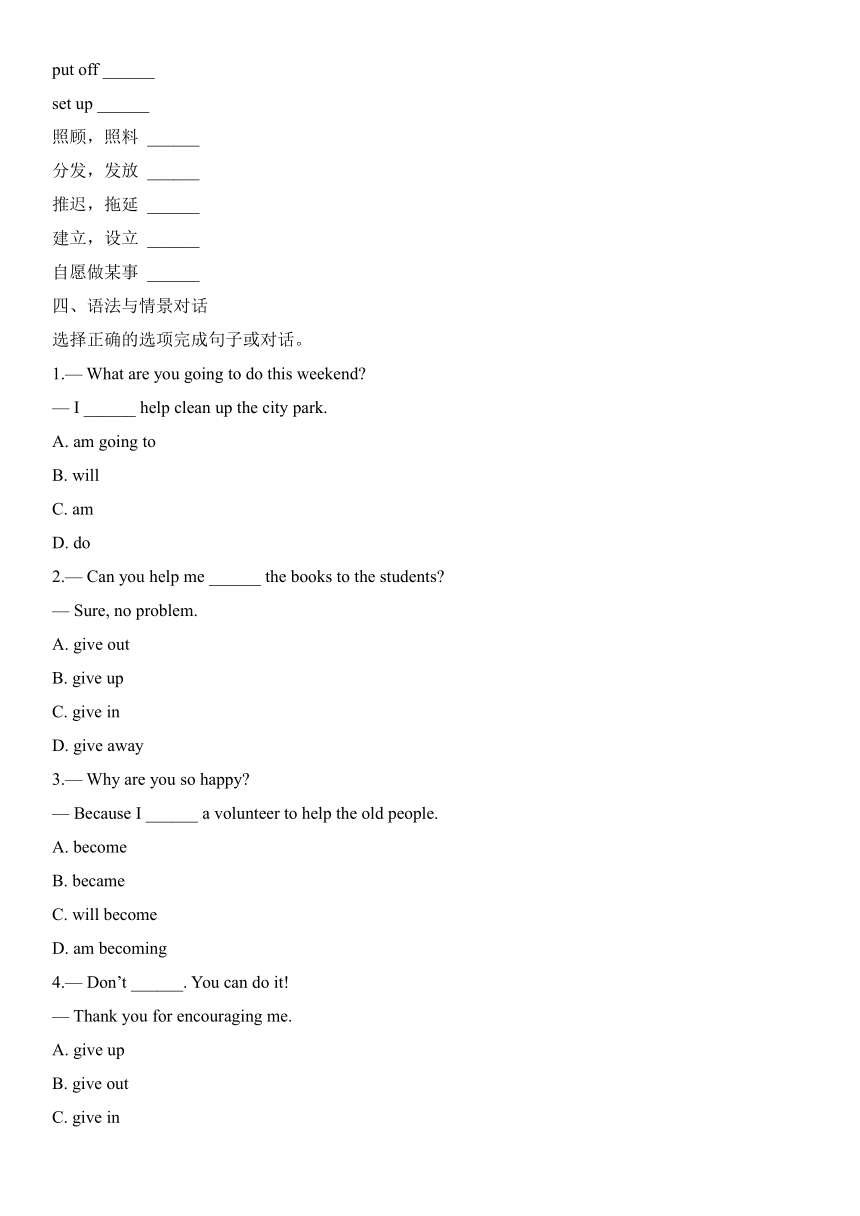
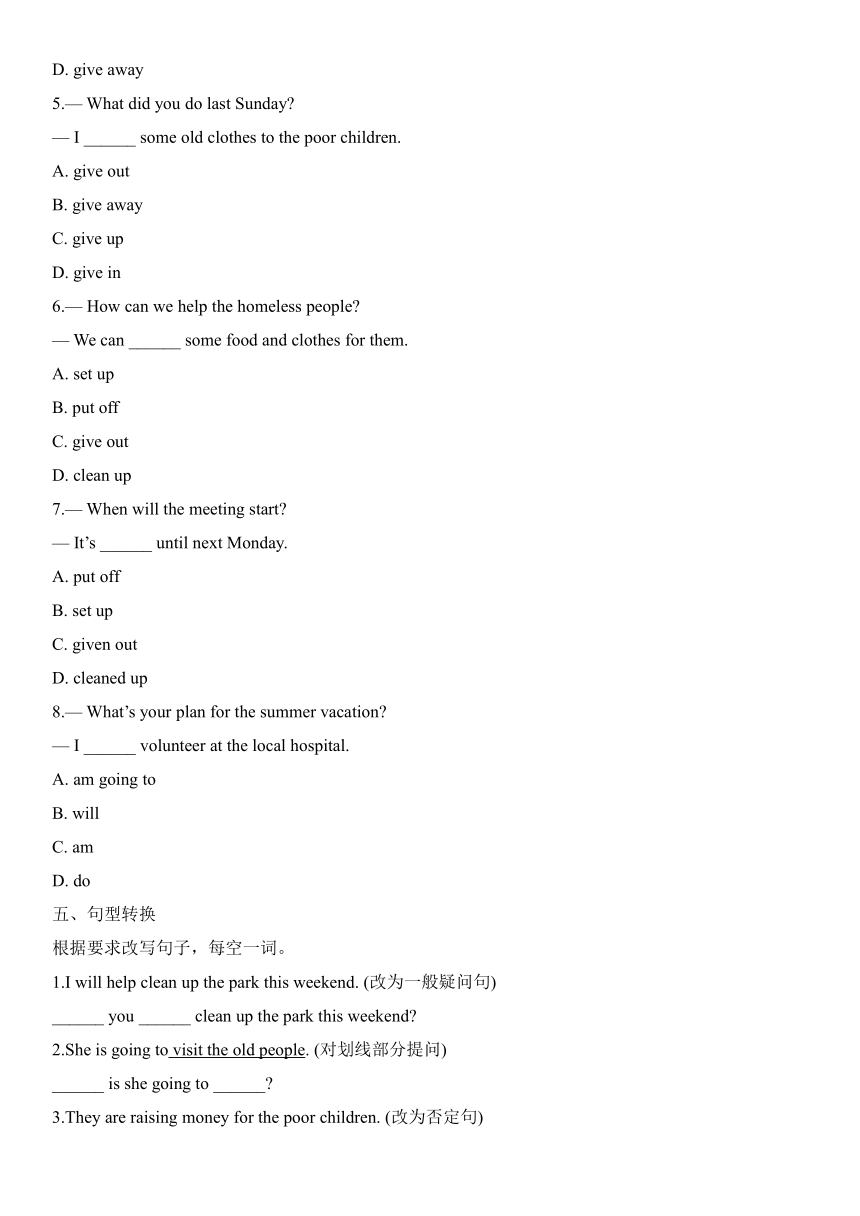
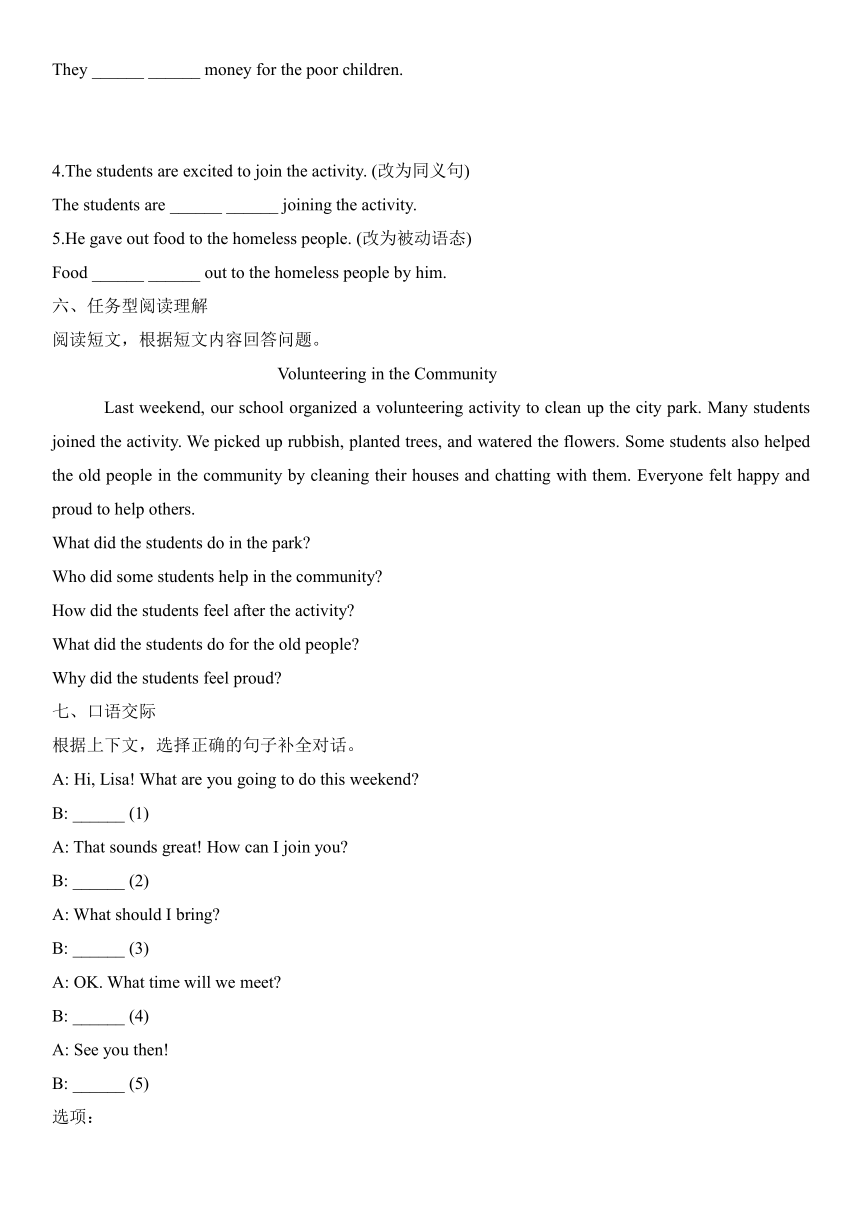
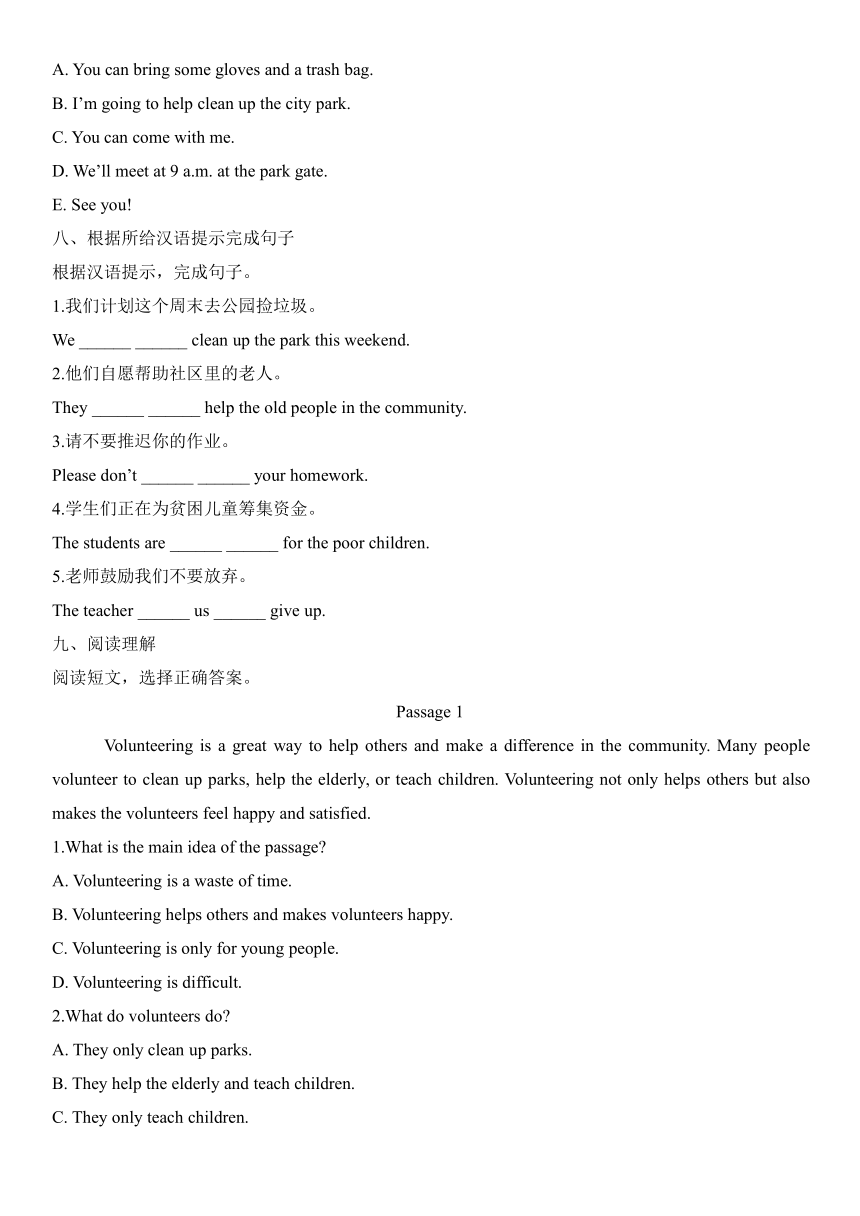
文档简介
人教新目标 Go For It 八年级英语下册
Unit 2 I`ll help to clean up the city parks Section A 习题
一、单词拼写
根据句意及首字母提示,写出所缺单词。
We should c______ up the park to make it clean and beautiful.
The students are v______ to help the old people in the community.
She is a k______ girl who always helps others.
The city needs more people to p______ trees to protect the environment.
The children are e______ to join the cleaning activity this weekend.
The teacher e______ us to work harder and never give up.
The boy is c______ about his homework and always finishes it on time.
The government is trying to s______ the problem of air pollution.
The students are r______ money for the children in poor areas.
The old man lives a______, so we often visit him to keep him company.
二、词性转换
根据括号内的提示,写出单词的正确形式。
She is a very ______ (help) person who always volunteers in her free time.
The ______ (clean) of the city park is our responsibility.
The children were ______ (excite) to see the results of their hard work.
The old man felt ______ (lonely) after his wife passed away.
The students are ______ (cheer) when they see the clean park.
The government is taking ______ (act) to solve the environmental problems.
The boy is ______ (care) with his homework and never makes mistakes.
The teacher gave us some ______ (encourage) to keep trying.
The ______ (kind) of the volunteers touched everyone’s heart.
The students are ______ (raise) money for the homeless people.
三、短语英汉互译
将下列短语翻译成中文或英文。
clean up ______
cheer up ______
give out ______
put off ______
set up ______
照顾,照料 ______
分发,发放 ______
推迟,拖延 ______
建立,设立 ______
自愿做某事 ______
四、语法与情景对话
选择正确的选项完成句子或对话。
1.— What are you going to do this weekend
— I ______ help clean up the city park.
A. am going to
B. will
C. am
D. do
2.— Can you help me ______ the books to the students
— Sure, no problem.
A. give out
B. give up
C. give in
D. give away
3.— Why are you so happy
— Because I ______ a volunteer to help the old people.
A. become
B. became
C. will become
D. am becoming
4.— Don’t ______. You can do it!
— Thank you for encouraging me.
A. give up
B. give out
C. give in
D. give away
5.— What did you do last Sunday
— I ______ some old clothes to the poor children.
A. give out
B. give away
C. give up
D. give in
6.— How can we help the homeless people
— We can ______ some food and clothes for them.
A. set up
B. put off
C. give out
D. clean up
7.— When will the meeting start
— It’s ______ until next Monday.
A. put off
B. set up
C. given out
D. cleaned up
8.— What’s your plan for the summer vacation
— I ______ volunteer at the local hospital.
A. am going to
B. will
C. am
D. do
五、句型转换
根据要求改写句子,每空一词。
1.I will help clean up the park this weekend. (改为一般疑问句)
______ you ______ clean up the park this weekend
2.She is going to visit the old people. (对划线部分提问)
______ is she going to ______
3.They are raising money for the poor children. (改为否定句)
They ______ ______ money for the poor children.
4.The students are excited to join the activity. (改为同义句)
The students are ______ ______ joining the activity.
5.He gave out food to the homeless people. (改为被动语态)
Food ______ ______ out to the homeless people by him.
六、任务型阅读理解
阅读短文,根据短文内容回答问题。
Volunteering in the Community
Last weekend, our school organized a volunteering activity to clean up the city park. Many students joined the activity. We picked up rubbish, planted trees, and watered the flowers. Some students also helped the old people in the community by cleaning their houses and chatting with them. Everyone felt happy and proud to help others.
What did the students do in the park
Who did some students help in the community
How did the students feel after the activity
What did the students do for the old people
Why did the students feel proud
七、口语交际
根据上下文,选择正确的句子补全对话。
A: Hi, Lisa! What are you going to do this weekend
B: ______ (1)
A: That sounds great! How can I join you
B: ______ (2)
A: What should I bring
B: ______ (3)
A: OK. What time will we meet
B: ______ (4)
A: See you then!
B: ______ (5)
选项:
A. You can bring some gloves and a trash bag.
B. I’m going to help clean up the city park.
C. You can come with me.
D. We’ll meet at 9 a.m. at the park gate.
E. See you!
八、根据所给汉语提示完成句子
根据汉语提示,完成句子。
1.我们计划这个周末去公园捡垃圾。
We ______ ______ clean up the park this weekend.
2.他们自愿帮助社区里的老人。
They ______ ______ help the old people in the community.
3.请不要推迟你的作业。
Please don’t ______ ______ your homework.
4.学生们正在为贫困儿童筹集资金。
The students are ______ ______ for the poor children.
5.老师鼓励我们不要放弃。
The teacher ______ us ______ give up.
九、阅读理解
阅读短文,选择正确答案。
Passage 1
Volunteering is a great way to help others and make a difference in the community. Many people volunteer to clean up parks, help the elderly, or teach children. Volunteering not only helps others but also makes the volunteers feel happy and satisfied.
1.What is the main idea of the passage
A. Volunteering is a waste of time.
B. Volunteering helps others and makes volunteers happy.
C. Volunteering is only for young people.
D. Volunteering is difficult.
2.What do volunteers do
A. They only clean up parks.
B. They help the elderly and teach children.
C. They only teach children.
D. They only help the elderly.
Passage 2
Last month, our school organized a volunteering activity to help the homeless people. We collected clothes, food, and money for them. We also visited the homeless shelter and spent time with them. Everyone felt happy to help those in need.
What did the students do for the homeless people
3.A. They only collected money.
B. They collected clothes, food, and money.
C. They only visited the homeless shelter.
D. They only spent time with them.
4.How did the students feel after the activity
A. They felt tired.
B. They felt happy.
C. They felt sad.
D. They felt bored.
答案解析
一、单词拼写
clean。clean up 为固定短语,意为 “打扫干净”,此句表示打扫公园使其干净美丽,故填 clean。
volunteering。此句表示学生们自愿去帮助社区里的老人,are + 现在分词构成现在进行时,volunteer 的现在分词为 volunteering,故填 volunteering。
kind。根据 “who always helps others” 可知她是个善良的女孩,kind 意为 “善良的”,故填 kind。
plant。plant trees 意为 “种树”,城市需要更多人种树保护环境,故填 plant。
excited。be excited to do sth. 表示 “对做某事感到兴奋”,孩子们对参加周末的清洁活动感到兴奋,故填 excited。
encourages。encourage sb. to do sth. 表示 “鼓励某人做某事”,主语 the teacher 是第三人称单数,一般现在时中谓语动词用第三人称单数形式 encourages,故填 encourages。
careful。be careful about 表示 “对…… 认真”,这个男孩对作业认真,总是按时完成,故填 careful。
solve。solve the problem 表示 “解决问题”,政府努力解决空气污染问题,故填 solve。
raising。are + 现在分词构成现在进行时,raise money 表示 “筹集资金”,raise 的现在分词为 raising,故填 raising。
alone。live alone 表示 “独自居住”,这个老人独自居住,所以我们常去陪伴他,故填 alone。
二、词性转换
helpful。help 是动词,此处需用形容词修饰名词 person,helpful 意为 “有帮助的”,故填 helpful。
cleaning。定冠词 the 后接名词,clean 的动名词形式 cleaning 可表示 “打扫” 这一行为,故填 cleaning。
excited。excite 为动词,此处修饰人 “children”,用形容词 excited,意为 “感到兴奋的”,故填 excited。
lonely。feel 是系动词,后接形容词,lonely 意为 “孤独的”,强调情感上的孤独,故填 lonely。
cheerful。cheer 是动词,此处用形容词 cheerful 表示 “高兴的”,学生们看到干净的公园很高兴,故填 cheerful。
action。take action 为固定短语,意为 “采取行动”,故填 action。
careful。be careful with 表示 “对…… 小心”,此处表示男孩对作业小心,故填 careful。
encouragement。give sb. sth.,此处需用名词,encourage 的名词形式为 encouragement,意为 “鼓励”,故填 encouragement。
kindness。定冠词 the 后接名词,kind 的名词形式 kindness 意为 “善良”,志愿者的善良触动了每个人的心,故填 kindness。
raising。are + 现在分词构成现在进行时,raise 的现在分词为 raising,故填 raising。
三、短语英汉互译
打扫干净
使高兴;使振作
分发;散发
推迟
建立;设立
take care of
give out
put off
set up
volunteer to do sth.
四、语法与情景对话
A。“be going to + 动词原形” 表示计划、打算做某事,根据问句 “这个周末你打算做什么”,答句应用 be going to 结构,主语是 I,be 动词用 am,故选 A。
A。give out 意为 “分发”;give up 意为 “放弃”;give in 意为 “屈服”;give away 意为 “捐赠”。此句表示把书分发给学生,故选 A。
C。根据语境,“因为我将成为一名帮助老人的志愿者”,表示将来的动作,用一般将来时 will + 动词原形,故选 C。
A。give up 意为 “放弃”;give out 意为 “分发”;give in 意为 “屈服”;give away 意为 “捐赠”。根据 “You can do it!(你能做到!)” 可知是鼓励对方不要放弃,故选 A。
B。give out 意为 “分发”;give away 意为 “捐赠”;give up 意为 “放弃”;give in 意为 “屈服”。此句表示把旧衣服捐赠给贫困儿童,故选 B。
C。set up 意为 “建立”;put off 意为 “推迟”;give out 意为 “分发”;clean up 意为 “打扫干净”。此句表示为无家可归的人分发食物和衣服,故选 C。
A。put off 意为 “推迟”;set up 意为 “建立”;give out 意为 “分发”;clean up 意为 “打扫干净”。根据语境,会议被推迟到下周一,故选 A。
A。“be going to + 动词原形” 表示计划、打算做某事,根据问句 “你暑假的计划是什么”,答句应用 be going to 结构,主语是 I,be 动词用 am,故选 A。
五、句型转换
Will; help。一般将来时的一般疑问句,将 will 提到句首,动词原形 help 不变,故填 Will; help。
What; do。对 “visit the old people”(做的事情)提问用 What,be going to 后接动词原形 do,故填 What; do。
aren't raising。现在进行时的否定句,在 be 动词后加 not,are not 缩写为 aren't,故填 aren't raising。
excited about。be excited to do sth. = be excited about doing sth.,都表示 “对做某事感到兴奋”,故填 excited about。
was given。一般过去时的被动语态结构为 was/were + 过去分词,主语 food 是不可数名词,be 动词用 was,give 的过去分词是 given,故填 was given。
六、任务型阅读理解
They picked up rubbish, planted trees, and watered the flowers. 根据短文 “We picked up rubbish, planted trees, and watered the flowers.” 可知学生们在公园里捡垃圾、种树和浇花。
They helped the old people in the community. 根据短文 “Some students also helped the old people in the community...” 可知一些学生帮助了社区里的老人。
They felt happy and proud. 根据短文 “Everyone felt happy and proud to help others.” 可知活动后学生们感到开心和自豪。
They cleaned their houses and chatted with them. 根据短文 “Some students also helped the old people in the community by cleaning their houses and chatting with them.” 可知学生们为老人打扫房子并和他们聊天。
Because they helped others. 根据短文 “Everyone felt happy and proud to help others.” 可知学生们因为帮助了别人而感到自豪。
七、口语交际
B。根据上文询问周末打算做什么,B 选项 “我打算去帮助打扫城市公园” 符合语境,故选 B。
C。上文询问如何加入,C 选项 “你可以和我一起去” 回答了加入的方式,故选 C。
A。上文询问应该带什么,A 选项 “你可以带一些手套和一个垃圾袋” 符合语境,故选 A。
D。上文询问见面时间,D 选项 “我们上午 9 点在公园门口见面” 回答了时间和地点,故选 D。
E。上文说 “See you then!(到时候见!)”,回答用 “See you!(再见!)”,故选 E。
八、根据所给汉语提示完成句子
plan to。plan to do sth. 表示 “计划做某事”,此句为一般现在时,主语是 We,动词用原形 plan,故填 plan to。
volunteer to。volunteer to do sth. 表示 “自愿做某事”,此句为一般现在时,主语是 They,动词用原形 volunteer,故填 volunteer to。
put off。put off 表示 “推迟”,don't 后接动词原形,故填 put off。
raising money。根据 “正在” 可知用现在进行时,结构为 be + 现在分词,raise money 表示 “筹集资金”,raise 的现在分词为 raising,故填 raising money。
encourages; not to。encourage sb. not to do sth. 表示 “鼓励某人不要做某事”,主语 the teacher 是第三人称单数,一般现在时中谓语动词用第三人称单数形式 encourages,故填 encourages; not to。
九、阅读理解
B。文章第一句 “Volunteering is a great way to help others and make a difference in the community.” 及最后一句 “Volunteering not only helps others but also makes the volunteers feel happy and satisfied.” 表明志愿服务不仅帮助他人还让志愿者开心,B 选项符合,A 选项 “志愿服务是浪费时间” 错误,C 选项 “志愿服务只适合年轻人” 文中未提及,D 选项 “志愿服务很难” 文中未提及,故选 B。
B。根据 “Many people volunteer to clean up parks, help the elderly, or teach children.” 可知志愿者会打扫公园、帮助老人或教孩子,B 选项全面,A、C、D 选项表述片面,故选 B。
B。根据 “We collected clothes, food, and money for them.” 可知学生们为无家可归的人收集了衣服、食物和钱,B 选项正确,A 选项 “只收集钱” 错误,C 选项 “只参观了无家可归者收容所” 错误,D 选项 “只和他们待在一起” 错误,故选 B。
B。根据 “Everyone felt happy to help those in need.” 可知活动后学生们感到开心,B 选项正确,A 选项 “感到累”、C 选项 “感到难过”、D 选项 “感到无聊” 均错误,故选 B。
Unit 2 I`ll help to clean up the city parks Section A 习题
一、单词拼写
根据句意及首字母提示,写出所缺单词。
We should c______ up the park to make it clean and beautiful.
The students are v______ to help the old people in the community.
She is a k______ girl who always helps others.
The city needs more people to p______ trees to protect the environment.
The children are e______ to join the cleaning activity this weekend.
The teacher e______ us to work harder and never give up.
The boy is c______ about his homework and always finishes it on time.
The government is trying to s______ the problem of air pollution.
The students are r______ money for the children in poor areas.
The old man lives a______, so we often visit him to keep him company.
二、词性转换
根据括号内的提示,写出单词的正确形式。
She is a very ______ (help) person who always volunteers in her free time.
The ______ (clean) of the city park is our responsibility.
The children were ______ (excite) to see the results of their hard work.
The old man felt ______ (lonely) after his wife passed away.
The students are ______ (cheer) when they see the clean park.
The government is taking ______ (act) to solve the environmental problems.
The boy is ______ (care) with his homework and never makes mistakes.
The teacher gave us some ______ (encourage) to keep trying.
The ______ (kind) of the volunteers touched everyone’s heart.
The students are ______ (raise) money for the homeless people.
三、短语英汉互译
将下列短语翻译成中文或英文。
clean up ______
cheer up ______
give out ______
put off ______
set up ______
照顾,照料 ______
分发,发放 ______
推迟,拖延 ______
建立,设立 ______
自愿做某事 ______
四、语法与情景对话
选择正确的选项完成句子或对话。
1.— What are you going to do this weekend
— I ______ help clean up the city park.
A. am going to
B. will
C. am
D. do
2.— Can you help me ______ the books to the students
— Sure, no problem.
A. give out
B. give up
C. give in
D. give away
3.— Why are you so happy
— Because I ______ a volunteer to help the old people.
A. become
B. became
C. will become
D. am becoming
4.— Don’t ______. You can do it!
— Thank you for encouraging me.
A. give up
B. give out
C. give in
D. give away
5.— What did you do last Sunday
— I ______ some old clothes to the poor children.
A. give out
B. give away
C. give up
D. give in
6.— How can we help the homeless people
— We can ______ some food and clothes for them.
A. set up
B. put off
C. give out
D. clean up
7.— When will the meeting start
— It’s ______ until next Monday.
A. put off
B. set up
C. given out
D. cleaned up
8.— What’s your plan for the summer vacation
— I ______ volunteer at the local hospital.
A. am going to
B. will
C. am
D. do
五、句型转换
根据要求改写句子,每空一词。
1.I will help clean up the park this weekend. (改为一般疑问句)
______ you ______ clean up the park this weekend
2.She is going to visit the old people. (对划线部分提问)
______ is she going to ______
3.They are raising money for the poor children. (改为否定句)
They ______ ______ money for the poor children.
4.The students are excited to join the activity. (改为同义句)
The students are ______ ______ joining the activity.
5.He gave out food to the homeless people. (改为被动语态)
Food ______ ______ out to the homeless people by him.
六、任务型阅读理解
阅读短文,根据短文内容回答问题。
Volunteering in the Community
Last weekend, our school organized a volunteering activity to clean up the city park. Many students joined the activity. We picked up rubbish, planted trees, and watered the flowers. Some students also helped the old people in the community by cleaning their houses and chatting with them. Everyone felt happy and proud to help others.
What did the students do in the park
Who did some students help in the community
How did the students feel after the activity
What did the students do for the old people
Why did the students feel proud
七、口语交际
根据上下文,选择正确的句子补全对话。
A: Hi, Lisa! What are you going to do this weekend
B: ______ (1)
A: That sounds great! How can I join you
B: ______ (2)
A: What should I bring
B: ______ (3)
A: OK. What time will we meet
B: ______ (4)
A: See you then!
B: ______ (5)
选项:
A. You can bring some gloves and a trash bag.
B. I’m going to help clean up the city park.
C. You can come with me.
D. We’ll meet at 9 a.m. at the park gate.
E. See you!
八、根据所给汉语提示完成句子
根据汉语提示,完成句子。
1.我们计划这个周末去公园捡垃圾。
We ______ ______ clean up the park this weekend.
2.他们自愿帮助社区里的老人。
They ______ ______ help the old people in the community.
3.请不要推迟你的作业。
Please don’t ______ ______ your homework.
4.学生们正在为贫困儿童筹集资金。
The students are ______ ______ for the poor children.
5.老师鼓励我们不要放弃。
The teacher ______ us ______ give up.
九、阅读理解
阅读短文,选择正确答案。
Passage 1
Volunteering is a great way to help others and make a difference in the community. Many people volunteer to clean up parks, help the elderly, or teach children. Volunteering not only helps others but also makes the volunteers feel happy and satisfied.
1.What is the main idea of the passage
A. Volunteering is a waste of time.
B. Volunteering helps others and makes volunteers happy.
C. Volunteering is only for young people.
D. Volunteering is difficult.
2.What do volunteers do
A. They only clean up parks.
B. They help the elderly and teach children.
C. They only teach children.
D. They only help the elderly.
Passage 2
Last month, our school organized a volunteering activity to help the homeless people. We collected clothes, food, and money for them. We also visited the homeless shelter and spent time with them. Everyone felt happy to help those in need.
What did the students do for the homeless people
3.A. They only collected money.
B. They collected clothes, food, and money.
C. They only visited the homeless shelter.
D. They only spent time with them.
4.How did the students feel after the activity
A. They felt tired.
B. They felt happy.
C. They felt sad.
D. They felt bored.
答案解析
一、单词拼写
clean。clean up 为固定短语,意为 “打扫干净”,此句表示打扫公园使其干净美丽,故填 clean。
volunteering。此句表示学生们自愿去帮助社区里的老人,are + 现在分词构成现在进行时,volunteer 的现在分词为 volunteering,故填 volunteering。
kind。根据 “who always helps others” 可知她是个善良的女孩,kind 意为 “善良的”,故填 kind。
plant。plant trees 意为 “种树”,城市需要更多人种树保护环境,故填 plant。
excited。be excited to do sth. 表示 “对做某事感到兴奋”,孩子们对参加周末的清洁活动感到兴奋,故填 excited。
encourages。encourage sb. to do sth. 表示 “鼓励某人做某事”,主语 the teacher 是第三人称单数,一般现在时中谓语动词用第三人称单数形式 encourages,故填 encourages。
careful。be careful about 表示 “对…… 认真”,这个男孩对作业认真,总是按时完成,故填 careful。
solve。solve the problem 表示 “解决问题”,政府努力解决空气污染问题,故填 solve。
raising。are + 现在分词构成现在进行时,raise money 表示 “筹集资金”,raise 的现在分词为 raising,故填 raising。
alone。live alone 表示 “独自居住”,这个老人独自居住,所以我们常去陪伴他,故填 alone。
二、词性转换
helpful。help 是动词,此处需用形容词修饰名词 person,helpful 意为 “有帮助的”,故填 helpful。
cleaning。定冠词 the 后接名词,clean 的动名词形式 cleaning 可表示 “打扫” 这一行为,故填 cleaning。
excited。excite 为动词,此处修饰人 “children”,用形容词 excited,意为 “感到兴奋的”,故填 excited。
lonely。feel 是系动词,后接形容词,lonely 意为 “孤独的”,强调情感上的孤独,故填 lonely。
cheerful。cheer 是动词,此处用形容词 cheerful 表示 “高兴的”,学生们看到干净的公园很高兴,故填 cheerful。
action。take action 为固定短语,意为 “采取行动”,故填 action。
careful。be careful with 表示 “对…… 小心”,此处表示男孩对作业小心,故填 careful。
encouragement。give sb. sth.,此处需用名词,encourage 的名词形式为 encouragement,意为 “鼓励”,故填 encouragement。
kindness。定冠词 the 后接名词,kind 的名词形式 kindness 意为 “善良”,志愿者的善良触动了每个人的心,故填 kindness。
raising。are + 现在分词构成现在进行时,raise 的现在分词为 raising,故填 raising。
三、短语英汉互译
打扫干净
使高兴;使振作
分发;散发
推迟
建立;设立
take care of
give out
put off
set up
volunteer to do sth.
四、语法与情景对话
A。“be going to + 动词原形” 表示计划、打算做某事,根据问句 “这个周末你打算做什么”,答句应用 be going to 结构,主语是 I,be 动词用 am,故选 A。
A。give out 意为 “分发”;give up 意为 “放弃”;give in 意为 “屈服”;give away 意为 “捐赠”。此句表示把书分发给学生,故选 A。
C。根据语境,“因为我将成为一名帮助老人的志愿者”,表示将来的动作,用一般将来时 will + 动词原形,故选 C。
A。give up 意为 “放弃”;give out 意为 “分发”;give in 意为 “屈服”;give away 意为 “捐赠”。根据 “You can do it!(你能做到!)” 可知是鼓励对方不要放弃,故选 A。
B。give out 意为 “分发”;give away 意为 “捐赠”;give up 意为 “放弃”;give in 意为 “屈服”。此句表示把旧衣服捐赠给贫困儿童,故选 B。
C。set up 意为 “建立”;put off 意为 “推迟”;give out 意为 “分发”;clean up 意为 “打扫干净”。此句表示为无家可归的人分发食物和衣服,故选 C。
A。put off 意为 “推迟”;set up 意为 “建立”;give out 意为 “分发”;clean up 意为 “打扫干净”。根据语境,会议被推迟到下周一,故选 A。
A。“be going to + 动词原形” 表示计划、打算做某事,根据问句 “你暑假的计划是什么”,答句应用 be going to 结构,主语是 I,be 动词用 am,故选 A。
五、句型转换
Will; help。一般将来时的一般疑问句,将 will 提到句首,动词原形 help 不变,故填 Will; help。
What; do。对 “visit the old people”(做的事情)提问用 What,be going to 后接动词原形 do,故填 What; do。
aren't raising。现在进行时的否定句,在 be 动词后加 not,are not 缩写为 aren't,故填 aren't raising。
excited about。be excited to do sth. = be excited about doing sth.,都表示 “对做某事感到兴奋”,故填 excited about。
was given。一般过去时的被动语态结构为 was/were + 过去分词,主语 food 是不可数名词,be 动词用 was,give 的过去分词是 given,故填 was given。
六、任务型阅读理解
They picked up rubbish, planted trees, and watered the flowers. 根据短文 “We picked up rubbish, planted trees, and watered the flowers.” 可知学生们在公园里捡垃圾、种树和浇花。
They helped the old people in the community. 根据短文 “Some students also helped the old people in the community...” 可知一些学生帮助了社区里的老人。
They felt happy and proud. 根据短文 “Everyone felt happy and proud to help others.” 可知活动后学生们感到开心和自豪。
They cleaned their houses and chatted with them. 根据短文 “Some students also helped the old people in the community by cleaning their houses and chatting with them.” 可知学生们为老人打扫房子并和他们聊天。
Because they helped others. 根据短文 “Everyone felt happy and proud to help others.” 可知学生们因为帮助了别人而感到自豪。
七、口语交际
B。根据上文询问周末打算做什么,B 选项 “我打算去帮助打扫城市公园” 符合语境,故选 B。
C。上文询问如何加入,C 选项 “你可以和我一起去” 回答了加入的方式,故选 C。
A。上文询问应该带什么,A 选项 “你可以带一些手套和一个垃圾袋” 符合语境,故选 A。
D。上文询问见面时间,D 选项 “我们上午 9 点在公园门口见面” 回答了时间和地点,故选 D。
E。上文说 “See you then!(到时候见!)”,回答用 “See you!(再见!)”,故选 E。
八、根据所给汉语提示完成句子
plan to。plan to do sth. 表示 “计划做某事”,此句为一般现在时,主语是 We,动词用原形 plan,故填 plan to。
volunteer to。volunteer to do sth. 表示 “自愿做某事”,此句为一般现在时,主语是 They,动词用原形 volunteer,故填 volunteer to。
put off。put off 表示 “推迟”,don't 后接动词原形,故填 put off。
raising money。根据 “正在” 可知用现在进行时,结构为 be + 现在分词,raise money 表示 “筹集资金”,raise 的现在分词为 raising,故填 raising money。
encourages; not to。encourage sb. not to do sth. 表示 “鼓励某人不要做某事”,主语 the teacher 是第三人称单数,一般现在时中谓语动词用第三人称单数形式 encourages,故填 encourages; not to。
九、阅读理解
B。文章第一句 “Volunteering is a great way to help others and make a difference in the community.” 及最后一句 “Volunteering not only helps others but also makes the volunteers feel happy and satisfied.” 表明志愿服务不仅帮助他人还让志愿者开心,B 选项符合,A 选项 “志愿服务是浪费时间” 错误,C 选项 “志愿服务只适合年轻人” 文中未提及,D 选项 “志愿服务很难” 文中未提及,故选 B。
B。根据 “Many people volunteer to clean up parks, help the elderly, or teach children.” 可知志愿者会打扫公园、帮助老人或教孩子,B 选项全面,A、C、D 选项表述片面,故选 B。
B。根据 “We collected clothes, food, and money for them.” 可知学生们为无家可归的人收集了衣服、食物和钱,B 选项正确,A 选项 “只收集钱” 错误,C 选项 “只参观了无家可归者收容所” 错误,D 选项 “只和他们待在一起” 错误,故选 B。
B。根据 “Everyone felt happy to help those in need.” 可知活动后学生们感到开心,B 选项正确,A 选项 “感到累”、C 选项 “感到难过”、D 选项 “感到无聊” 均错误,故选 B。
同课章节目录
- Unit 1 What's the matter?
- Section A
- Section B
- Unit 2 I'll help to clean up the city parks.
- Section A
- Section B
- Unit 3 Could you please clean your room?
- Section A
- Section B
- Unit 4 Why don't you talk to your parents?
- Section A
- Section B
- Unit 5 What were you doing when the rainstorm came
- Section A
- Section B
- Review of Units 1-5
- Unit 6 An old man tried to move the mountains.
- Section A
- Section B
- Unit 7 What's the highest mountain in the world?
- Section A
- Section B
- Unit 8 Have you read Treasure Island yet?
- Section A
- Section B
- Unit 9 Have you ever been to a museum?
- Section A
- Section B
- Unit 10 I've had this bike for three years.
- Section A
- Section B
